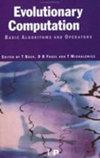Contributions to Dynamic Analysis of Differential Evolution Algorithms
IF 3.4
2区 计算机科学
Q2 COMPUTER SCIENCE, ARTIFICIAL INTELLIGENCE
引用次数: 0
Abstract
The Differential Evolution (DE) algorithm is one of the most successful evolutionary computation techniques. However, its structure is not trivially translatable in terms of mathematical transformations that describe its population dynamics. In this work, analytical expressions are developed for the probability of enhancement of individuals after each application of a mutation operator followed by a crossover operation, assuming a population distributed radially around the optimum for the sphere objective function, considering the DE/rand/1/bin and the DE/rand/1/exp algorithm versions. These expressions are validated by numerical experiments. Considering quadratic functions given by f(x)=xTDTDx and populations distributed according to the linear transformation D-1 of a radially distributed population, it is also shown that the expressions still hold in the cases when f(x) is separable (D is diagonal) and when D is any nonsingular matrix and the crossover rate is Cr=1.0. The expressions are employed for the analysis of DE population dynamics. The analysis is extended to more complex situations, reaching rather precise predictions of the effect of problem dimension and of the choice of algorithm parameters.差分进化算法动态分析的贡献
差分进化(DE)算法是最成功的进化计算技术之一。然而,它的结构在描述其人口动态的数学转换方面并不是简单的可翻译的。在这项工作中,考虑到DE/rand/1/bin和DE/rand/1/exp算法版本,假设种群分布在球体目标函数的最优点周围,在每次应用突变算子和交叉操作后,开发了个体增强概率的解析表达式。数值实验验证了这些表达式的正确性。考虑由f(x)=xTDTDx给出的二次函数和根据径向分布总体的线性变换D-1分布的总体,还证明了当f(x)可分(D为对角)和D为任意非奇异矩阵且交叉率为Cr=1.0时,表达式仍然成立。这些表达式用于DE种群动态分析。将分析扩展到更复杂的情况,对问题维数和算法参数选择的影响进行了相当精确的预测。
本文章由计算机程序翻译,如有差异,请以英文原文为准。
求助全文
约1分钟内获得全文
求助全文
来源期刊

Evolutionary Computation
工程技术-计算机:理论方法
CiteScore
6.40
自引率
1.50%
发文量
20
审稿时长
3 months
期刊介绍:
Evolutionary Computation is a leading journal in its field. It provides an international forum for facilitating and enhancing the exchange of information among researchers involved in both the theoretical and practical aspects of computational systems drawing their inspiration from nature, with particular emphasis on evolutionary models of computation such as genetic algorithms, evolutionary strategies, classifier systems, evolutionary programming, and genetic programming. It welcomes articles from related fields such as swarm intelligence (e.g. Ant Colony Optimization and Particle Swarm Optimization), and other nature-inspired computation paradigms (e.g. Artificial Immune Systems). As well as publishing articles describing theoretical and/or experimental work, the journal also welcomes application-focused papers describing breakthrough results in an application domain or methodological papers where the specificities of the real-world problem led to significant algorithmic improvements that could possibly be generalized to other areas.
 求助内容:
求助内容: 应助结果提醒方式:
应助结果提醒方式:


